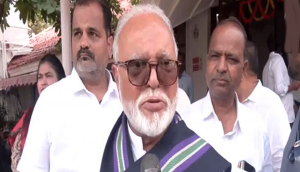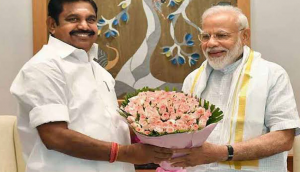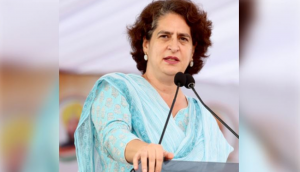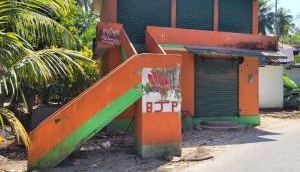Tamil Nadu: Opposition removed from his way, Palanisamy wins trust vote

Chief Minister Edappadi Palanisamy won the confidence vote in the Tamil Nadu assembly Saturday after the opposition DMK was bundled out and the Congress walked out.
His challenger, and predecessor, O Panneerselvam and his supporters did take part in the vote, but the Speaker declared Palanisamy had won by 122 votes to 11.
Panneerselvam and K Pandiarajan, one of the few MLAs loyal to him, told reporters after the controversial vote: "We may have lost the battle, but the war has just begun."
Also Read: Tamil Nadu: Palanisamy takes over as CM, but political uncertainty isn't over
Leader of the Opposition MK Stalin, his shirt torn in the fracas inside the assembly, alleged that after their eviction, the protesting DMK legislators were attacked by the police called by Speaker M Dhanapal. Video footage released by the Speaker, however, showed Stalin being evicted by the watch and ward staff of the assembly.
Ruckus ensued when Stalin demanded, as soon as the assembly sat, that given that the AIADMK legislators had been brought from a resort, the Speaker should either allow a secret ballot or defer the vote by a week to enable the representatives to vote of their free will. Stalin questioned why Palanisamy was in such hurry to conduct the vote when the governor had given him 15 days to prove majority. Stalin was backed by the Congress leader AR Ramaswamy.
The Speaker will , however, said there was no provision for a secret ballot. He also rejected the demand to put off the vote, saying he was bound by House Rules not to do so.
This led to a stand-off between the DMK and the Speaker, with a group of DMK legislators rushing to the well of the House, snatching the Speaker's microphone and upturning his podium.
The Speaker adjourned the House at 1 pm for two hours. After he left, a DMK member occupied his chair while another snatched the chair of the assembly's secretary. Some others tore up assembly papers.
When the House resumed at 3 pm, by when the Speaker had called the police to stand by, the DMK members persisted with their demand. Finding them unyielding, the Speaker ordered their mass eviction and called the marshals, leading to a scuffle.
The Congress walked out in protest against the Speaker's rejection of the opposition's demand.
So, when the Speaker called for a vote, only AIADMK members were present.
In a 234-member House with an effective strength of 233 - J Jayalalithaa's seat has fallen vacant - DMK leader M Karunanidhi didn't take part because of poor health and an AIADMK legislator from Coimbatore also stayed away. At the start of the session, 231 members were present, including the Speaker.
After the eviction of 89 DMK members, and the walkout by eight Congress MLAs and one of the IUML, 133 members were left. Of them, 122 voted in favour of Palanisamy and 11 against.
The Speaker accordingly declared Palanisamy the winner of the trust vote.
Also Read: Sasikala finally lands in prison. Will she rule by proxy now?
Panneerselvam and Pandiarajan, however, insisted that had the legislators been allowed to vote of their own free will, Palanisamy would have lost.
After the vote, Stalin met Governor C Vidyasagar Rao and gave his version of what happened in the assembly. Afterwards, he and his supporters sat on a dharna near the Gandhi statue on Marina Beach, a little distance from where Palanisamy and AIADMK deputy general secretary TTV Dinakaran, nephew of the jailed party chief Sasikala, paid homage at Jayalalithaa's memorial.
Apart from how the vote was conducted, what also caused controversy was the decision to not allow live coverage of the proceedings as is the norm in Parliament.
Today's happenings had much similarity to the events that eventually led to the dismissal of the Janaki ministry in January 1988 following a split in the AIADMK after the passing of its founder MG Ramachandran. At that time, 37 MLAs belonging to the Jayalalithaa faction had violently disrupted the House when Janaki, backed by 97 members, sought a trust vote. This led to the then Speaker PH Pandian expelling the AIADMK members supporting Jaya's proxy VR Nedunchechiyan as well as Congress MLAs. He then polled the remaining MLAs and declared Janaki the winner. Unlike today, however, the eight members of the DMK had remained neutral then.
The then governor SL Khurana dismissed the vote as a farcical exercise and upon his recommendation, the Janaki ministry was dismissed and President's Rule imposed in Tamil Nadu.
Palanisamy, though, has proven he has the support of 122 members, when the half way mark is 117. Now, whether the governor can look into if the 122 MLAs who stayed with him were free agents when they voted is debatable. Also, after the Supreme Court's Bommai verdict, the dismissal of an elected government can be challenged in court. Secondly, unlike before, even if President's Rule is imposed, the assembly has to be kept in suspended animation for six months to see if an alternative popular government can emerge.
The Speaker allowed the opposition members to speak on the confidence motion without any interruption from the AIADMK side. The AIADMK members, both Palanisamy supporters and rebels, maintained peace. As also the Congress members and the lone IUML legislator.
Panneerselvam referred to his faction as the "Jaya loyalists" and vowed to fight for "justice". Stalin, meanwhile, said the struggle against the "benami" government of Sasikala would continue.
Also Read: 'Mannargudi mafia': Meet the family likely to rule post-Jaya Tamil Nadu






![BJP's Kapil Mishra recreates Shankar Mahadevan’s ‘Breathless’ song to highlight Delhi pollution [WATCH] BJP's Kapil Mishra recreates Shankar Mahadevan’s ‘Breathless’ song to highlight Delhi pollution [WATCH]](https://images.catchnews.com/upload/2022/11/03/kapil-mishra_240884_300x172.png)

![Anupam Kher shares pictures of his toned body on 67th birthday [MUST SEE] Anupam Kher shares pictures of his toned body on 67th birthday [MUST SEE]](https://images.catchnews.com/upload/2022/03/07/Anupam_kher_231145_300x172.jpg)






